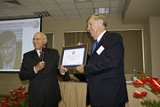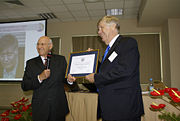
Jürgen Gmehling
Encyclopedia
Jürgen Gmehling is a German professor
for technical and industrial chemistry
at the Carl von Ossietzky University of Oldenburg
.
and then chemistry in Dortmund
and Clausthal. He received his diploma
from the University of Dortmund in 1970 and the PhD (Dr. rer. nat., inorganic chemistry
) in 1973. After this he worked as scientific coworker in Dortmund before he became a private lecturer and, after his habilitation
, an assistant professor.
Gmehling was appointed full professor for technical chemistry at the University of Oldenburg in 1989.
. This data bank is still named Dortmund Data Bank
, although it has expanded dramatically over the last decades, and is now maintained by a company located in Oldenburg
.
(Danmarks Tekniske Universitet), models for the estimation of several thermodynamic and thermophysical properties:
 Gmehling received the Arnold Eucken Award from the GVC (VDI
Gmehling received the Arnold Eucken Award from the GVC (VDI
society for chemical engineering). This award is aimed at supporting promising junior scientists.
In August 2008, Gmehling received the Rossini Lectureship Award during the 20th International Conference on Chemical Thermodynamics in Warsaw, Poland. This award is presented by the Board of Directors of the International Association of Chemical Thermodynamics (short IACT) and is given for important contributions to the field of chemical thermodynamics. An important part of the award presentation is that the laureate has to hold a lecture where he presents his current and past work.
for several others. Additionally he has been reviewing scientific projects for the German (Deutsche Forschungsgemeinschaft), Czech, Finnish, and Slovenian scientific societies.
Professor
A professor is a scholarly teacher; the precise meaning of the term varies by country. Literally, professor derives from Latin as a "person who professes" being usually an expert in arts or sciences; a teacher of high rank...
for technical and industrial chemistry
Chemistry
Chemistry is the science of matter, especially its chemical reactions, but also its composition, structure and properties. Chemistry is concerned with atoms and their interactions with other atoms, and particularly with the properties of chemical bonds....
at the Carl von Ossietzky University of Oldenburg
Carl von Ossietzky University of Oldenburg
The Carl von Ossietzky University of Oldenburg is a university in Oldenburg, Germany. It is one of the most important educational facilities in northwestern Germany and specialises in interdisciplinary studies.- History :...
.
Biography
His career started with an apprenticeship as laboratory assistant at the Duisburg copper works before he studied chemical engineering at the engineering school in EssenEssen
- Origin of the name :In German-speaking countries, the name of the city Essen often causes confusion as to its origins, because it is commonly known as the German infinitive of the verb for the act of eating, and/or the German noun for food. Although scholars still dispute the interpretation of...
and then chemistry in Dortmund
Dortmund
Dortmund is a city in Germany. It is located in the Bundesland of North Rhine-Westphalia, in the Ruhr area. Its population of 585,045 makes it the 7th largest city in Germany and the 34th largest in the European Union....
and Clausthal. He received his diploma
Diploma
A diploma is a certificate or deed issued by an educational institution, such as a university, that testifies that the recipient has successfully completed a particular course of study or confers an academic degree. In countries such as the United Kingdom and Australia, the word diploma refers to...
from the University of Dortmund in 1970 and the PhD (Dr. rer. nat., inorganic chemistry
Inorganic chemistry
Inorganic chemistry is the branch of chemistry concerned with the properties and behavior of inorganic compounds. This field covers all chemical compounds except the myriad organic compounds , which are the subjects of organic chemistry...
) in 1973. After this he worked as scientific coworker in Dortmund before he became a private lecturer and, after his habilitation
Habilitation
Habilitation is the highest academic qualification a scholar can achieve by his or her own pursuit in several European and Asian countries. Earned after obtaining a research doctorate, such as a PhD, habilitation requires the candidate to write a professorial thesis based on independent...
, an assistant professor.
Gmehling was appointed full professor for technical chemistry at the University of Oldenburg in 1989.
Fields of research
Gmehling's main focusses are measurement, collection and estimation of thermophysical properties of components and component mixtures. The following list summarizes several fields of his scientific work in a concise manner but is in no way complete.Measurements
- Phase equilibrium data (vapor-liquid equilibria, liquid-liquid equilibria, solid–liquid equilibria, gas solubilities, heats of mixing, activity coefficients and more)
- Pure component properties (heats of phase transitions, vapor pressures, densities, viscosities)
- Kinetics of reaction (heterogeneous catalysis)
Data collection
Gmehling began in the 1970s with the systematic evaluation of the scientific literature with the goal of building a data bank for vapor-liquid equilibria. These data were needed for the development of a new method for the prediction of activity coefficients named UNIFACUNIFAC
The UNIversal Functional Activity Coefficient method is a semi-empirical system for the prediction of non-electrolyte activity estimation in non-ideal mixtures. UNIFAC uses the functional groups present on the molecules that make up the liquid mixture to calculate activity coefficients...
. This data bank is still named Dortmund Data Bank
Dortmund Data Bank
The Dortmund Data Bank is a factual data bank for thermodynamic and thermophysical data. Its main usage is the data supply for process simulation where experimental data are the basis for the design, analysis, synthesis, and optimization of chemical processes...
, although it has expanded dramatically over the last decades, and is now maintained by a company located in Oldenburg
Oldenburg
Oldenburg is an independent city in Lower Saxony, Germany. It is situated in the western part of the state between the cities of Bremen and Groningen, Netherlands, at the Hunte river. It has a population of 160,279 which makes it the fourth biggest city in Lower Saxony after Hanover, Braunschweig...
.
Development of estimation and correlation models
Gmehling developed, together with coworkers and in cooperations, especially Professor Aage Fredenslund from the Technical University of DenmarkTechnical University of Denmark
The Technical University of Denmark , often simply referred to as DTU, is a university just north of Copenhagen, Denmark. It was founded in 1829 at the initiative of Hans Christian Ørsted as Denmark's first polytechnic, and is today ranked among Europe's leading engineering institutions, and the...
(Danmarks Tekniske Universitet), models for the estimation of several thermodynamic and thermophysical properties:
- Activity coefficient models like UNIFACUNIFACThe UNIversal Functional Activity Coefficient method is a semi-empirical system for the prediction of non-electrolyte activity estimation in non-ideal mixtures. UNIFAC uses the functional groups present on the molecules that make up the liquid mixture to calculate activity coefficients...
(see also group contribution methodGroup contribution methodA group contribution method is a technique to estimate and predict thermodynamic and other properties from molecular structures.- Introduction :In today's chemical processes hundreds of thousands of components are used...
) and extensions. For the further development of these widely used methods Gmehling founded an industry consortiumUNIFAC ConsortiumThe UNIFAC Consortium has been founded at the Carl von Ossietzky University of Oldenburg at the chair of industrial chemistry of Prof. Gmehling to invite private companies to support the further development of the group contribution methods UNIFAC and its successor modified UNIFAC...
where many international companies are participating. - Equations of state (EOS) including mixing rules for applying EOS to mixtures (see PSRKPSRKPSRK is an estimation method for the calculation of phase equilibria of mixtures of chemical components. The original goal for the development of this method was to enable the estimation of properties of mixtures which contain supercritical components...
). - gE models
- Prediction of pure component properties (normal boiling point, liquid viscosityViscosityViscosity is a measure of the resistance of a fluid which is being deformed by either shear or tensile stress. In everyday terms , viscosity is "thickness" or "internal friction". Thus, water is "thin", having a lower viscosity, while honey is "thick", having a higher viscosity...
, critical dataCritical point (thermodynamics)In physical chemistry, thermodynamics, chemistry and condensed matter physics, a critical point, also called a critical state, specifies the conditions at which a phase boundary ceases to exist...
)
Software development
The following implementation of his own methods are also considerable developments- an expert system for the entrainer selection for the azeotropic and extractive distillation
- programs for fitting parameters of gE models and many equations describing pure component properties
Other fields of work
Gmehling is also working on the research and optimization of chemical processes like reactive distillation and membrane processes.Awards

Verein Deutscher Ingenieure
Verein Deutscher Ingenieure is an organization of 139,000 engineers and natural scientists.Established in 1856, the VDI is today the largest engineering association in Western Europe....
society for chemical engineering). This award is aimed at supporting promising junior scientists.
In August 2008, Gmehling received the Rossini Lectureship Award during the 20th International Conference on Chemical Thermodynamics in Warsaw, Poland. This award is presented by the Board of Directors of the International Association of Chemical Thermodynamics (short IACT) and is given for important contributions to the field of chemical thermodynamics. An important part of the award presentation is that the laureate has to hold a lecture where he presents his current and past work.
Company foundations
Gmehling has founded two companies:- The DDBST GmbH was founded in 1989. Its main purpose is the further development of the Dortmund Data Bank.
- The LTP GmbH was founded in 1999. The main purpose is the experimental determination of thermophysical data.
Publications
Gmehling has published, besides numerous scientific articles, several books. These are textbooks (e.g. Thermodynamics and Unit Operations) as well as data collections that have been published by the DECHEMA (DECHEMA Chemistry Data Series, DCDS) and the publishers Wiley-VCH (Azeotropic Data).Reviewing
Gmehling is co-publisher of three scientific journals and reviewerPeer review
Peer review is a process of self-regulation by a profession or a process of evaluation involving qualified individuals within the relevant field. Peer review methods are employed to maintain standards, improve performance and provide credibility...
for several others. Additionally he has been reviewing scientific projects for the German (Deutsche Forschungsgemeinschaft), Czech, Finnish, and Slovenian scientific societies.

